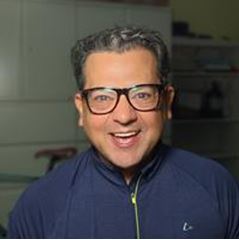Topic: Teaching cotton new tricks: Molecular strategies for developing functional fibers"
In this seminar, we will discuss examples of several strategies that our laboratory has pioneered to modify the properties of cotton. We have made possible cotton fibers that conduct electricity, kill bacteria, change color and store information. We will discuss how metal-organic frameworks (MOFs can be used to create textiles capable of sensing and trapping toxic gases, insecticides and other value-added compounds by judiciously controlling the interactions between the MOF and the functional groups on the surface of the natural fibers. We will also show how to create color using MOFs constructed using metals that emit color under UV radiation as well as the use of panchromatic modifications to MOF structures hence creating color without the need of pigments or dyes. These examples demonstrate how an “old” natural fiber such as cotton can be used as an engineering material with unique functionalities while preserving its comfort, flexibility and water absorbency properties. The strategies developed by our group to create multifunctional cellulosic materials are scalable and could be replicated in many other cellulose-based natural fibers.
Speaker: Juan Hinestroza, Ph.D.
 Juan P. Hinestroza, a U.S. Fulbright Scholar and a PMP®, is the Rebecca Q. Morgan '60 Professor of Fiber Science & Apparel Design, and directs The Textiles Nanotechnology Laboratory at the College of Human Ecology of Cornell University in Ithaca, NY. Professor Hinestroza works on understanding fundamental phenomena at the nanoscale that are of relevance to Fiber and Polymer Science. Hinestroza is an inventor of more than 31 granted international patents; an author of over 97 peer-reviewed articles and 5 book chapters; and editor of a seminal book on cellulose-based green composites. Hinestroza’s pioneering work has enabled the creation of 3 start-up companies, and he has served as a consultant to major Fortune 50 corporations, and investment banks in the field of smart and interactive textiles and fibers.
Juan P. Hinestroza, a U.S. Fulbright Scholar and a PMP®, is the Rebecca Q. Morgan '60 Professor of Fiber Science & Apparel Design, and directs The Textiles Nanotechnology Laboratory at the College of Human Ecology of Cornell University in Ithaca, NY. Professor Hinestroza works on understanding fundamental phenomena at the nanoscale that are of relevance to Fiber and Polymer Science. Hinestroza is an inventor of more than 31 granted international patents; an author of over 97 peer-reviewed articles and 5 book chapters; and editor of a seminal book on cellulose-based green composites. Hinestroza’s pioneering work has enabled the creation of 3 start-up companies, and he has served as a consultant to major Fortune 50 corporations, and investment banks in the field of smart and interactive textiles and fibers.
Professor Hinestroza obtained a Ph.D. from the Department of Chemical and Biomolecular Engineering at Tulane University and B.Sc. in Chemical Engineering from Universidad Industrial de Santander. Prior to pursuing doctoral studies, Professor Hinestroza worked as a process control engineer for The Dow Chemical Company. Hinestroza has received over 8.8 MM USD in funding (Federal and State agencies as well as Industrial Consortiums) for his research in understanding and exploring new pathways for creating multifunctional fibers via manipulation of nanoscale phenomena.
- Log in to post comments
